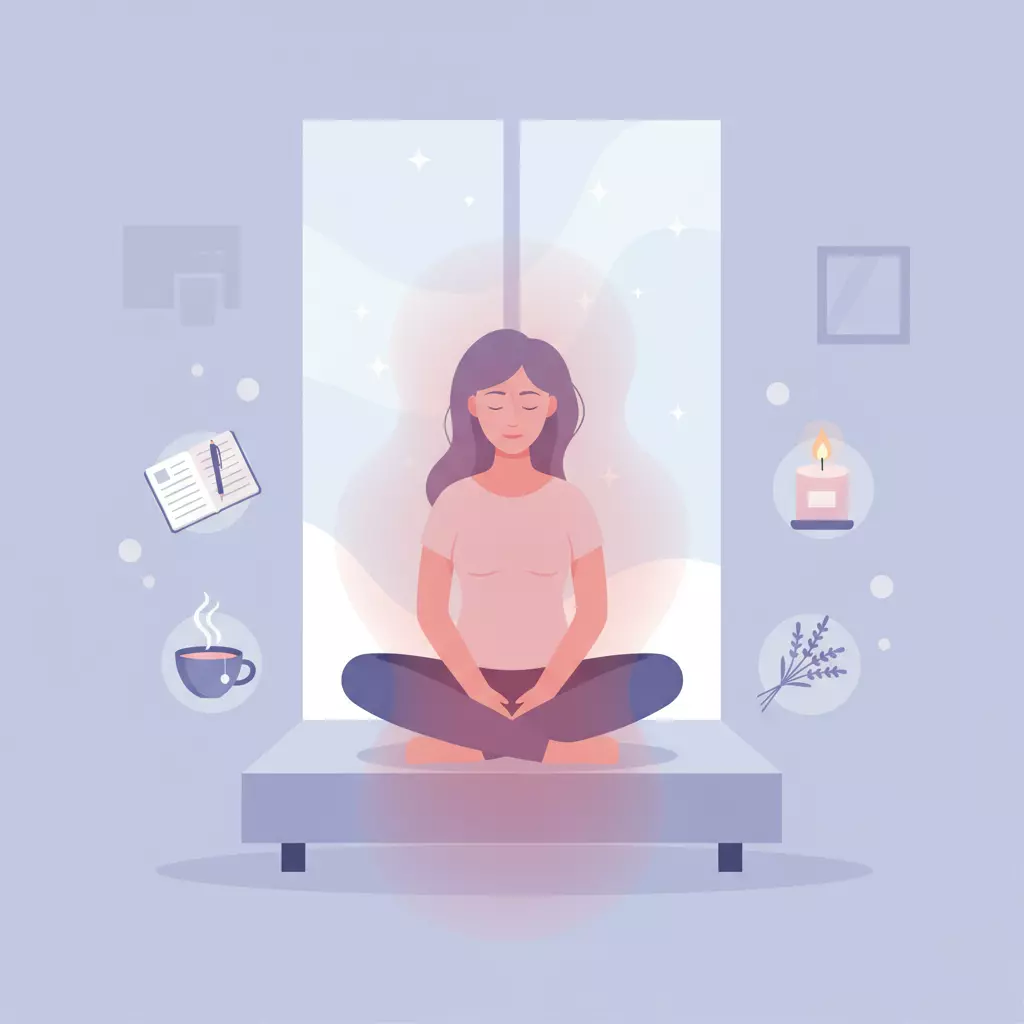Table of Contents
You know that feeling when the lights go out, and suddenly your brain decides it’s the perfect time to replay every scene of your breakup like a late-night drama you never asked to star in? That spiral has a name: nighttime rumination. The silence becomes heavy, the bed too big, and all the distractions that kept you afloat during the day vanish. This is when cravings hit hardest — the urge to text them, to scroll their socials, to sink into “what if.” It feels like relapse in the middle of the night.
But here’s the thing: what’s happening to you isn’t weakness. It’s biology. At night, your brain’s defenses are down, leaving more room for rumination — those repetitive, sticky thoughts that loop endlessly and make healing feel impossible. The trick isn’t to fight them head-on. It’s to give your mind and body a rhythm that gently carries you out of the spiral. That’s what a nighttime wind-down is for: not fluff, not “self-care aesthetics,” but a real healing strategy.
Why nights feel harder than days
During the day, life fills in the gaps. Work, friends, errands — they all act like buffers against emotional flooding. At night, those buffers disappear.
Research shows that insomnia and nighttime rumination are deeply connected: when thoughts won’t stop, your nervous system stays revved, blocking the rest your body craves. This is why nighttime crashes feel so intense — because both your brain and body are caught in a loop of alertness and ache.
And that’s exactly why nights are when relapse feels closest: reaching out to your ex, re-reading old texts, or spiraling into shame. Recognizing this isn’t about blaming yourself — it’s about preparing yourself with tools to change the script.

Why a ritual works better than willpower
It’s tempting to think, “I’ll just distract myself” or “I should be stronger by now.” But willpower burns out quickly at 11 p.m. when loneliness peaks.
Science tells us that structure — a repeatable set of cues — lowers the chances of spiraling. CBT-I studies show that routines reduce nighttime worry, and while rumination is more stubborn, consistent rituals reduce the brain’s opportunities to latch onto painful thoughts.

No Contact Isn’t a Game – It’s a Healing Strategy
Let’s examine the No Contact strategy in: Science & Psychology, Planning it, Digital Hygiene, Relapses-Cravings & Crashes, Special Cases & Exceptions… and Signs that it’s working +What comes next.
Tap here to read more →Think of it like training a puppy. You don’t argue with it when it gets restless; you show it what to do instead, over and over, until it learns. Your brain works the same way. A ritual isn’t about being rigid — it’s about creating a pathway out of craving and into rest.
The 5-step wind-down that actually sticks
- Screen cutoff – Pick a time, ideally an hour before bed, to put your phone down. Blue light isn’t the only issue; it’s the constant drip of stimulation that keeps your brain on edge.
- Light body release – Do a few minutes of gentle stretching or progressive relaxation. This isn’t a workout — it’s about telling your nervous system, “You can let go now.”
- Rumination dump – Grab a notebook and write down every looping thought. No judgment, no editing. Just externalize it. Your brain calms once it knows the thoughts are stored somewhere.
- Mindful anchor – Try three minutes of slow breathing, guided imagery, or even listening to a calming track. This interrupts the analysis spiral and shifts you into presence.
- Consistent cue – End with the same signal every night: a lavender scent, a specific playlist, or even a phrase you tell yourself. Over time, your brain will associate that cue with safety and sleep.

Reclaiming the night
This isn’t about perfection. Some nights you’ll still lie awake, some nights the spiral will tug harder. But by practicing these steps, you’re teaching your system a new language: one where the night doesn’t have to be a battlefield.
Healing after a breakup isn’t just about surviving the days; it’s about reclaiming the nights too. And with each small ritual, you remind yourself that even in the quiet, you are safe, you are healing, and you are moving forward.
FAQs: Nighttime Rumination
Q1: What is nighttime rumination and why does it feel worse after a breakup?
A1: Nighttime rumination is the repetitive replay of negative or distressing thoughts, often about the past. After a breakup, it feels stronger at night because daily distractions fade and the brain’s natural defenses lower, making cravings and emotional crashes more likely.
Q2: Can a bedtime routine really stop nighttime rumination?
A2: Yes. Research shows that structured wind-down routines reduce worry and cognitive arousal, which in turn weaken rumination. While not a quick fix, consistent bedtime rituals help train the brain to shift away from looping thoughts and toward rest.
Q3: How long does it take for a wind-down routine to ease nighttime rumination?
A3: Most people notice some relief within one to two weeks, but deeper benefits come with consistent practice over a month or more. The key is repetition — the brain learns to associate the routine with safety, making relapse less likely.
Q4: What are the best steps for women dealing with nighttime rumination after a breakup?
A4: The most effective steps are screen cutoff, light body release, journaling (rumination dump), a mindful anchor like breathing or meditation, and a consistent cue such as scent or sound. These simple practices calm the nervous system and reduce the power of nighttime rumination.
FAQ
Q1. What is nighttime rumination and why does it feel worse after a breakup?
Nighttime rumination is the repetitive replay of negative or distressing thoughts, often about the past. After a breakup, it feels stronger at night because daily distractions fade and the brain’s natural defenses lower, making cravings and emotional crashes more likely.
Q2. Can a bedtime routine really stop nighttime rumination?
Yes. Research shows that structured wind-down routines reduce worry and cognitive arousal, which in turn weaken rumination. While not a quick fix, consistent bedtime rituals help train the brain to shift away from looping thoughts and toward rest.
Q3. How long does it take for a wind-down routine to ease nighttime rumination?
Most people notice some relief within one to two weeks, but deeper benefits come with consistent practice over a month or more. The key is repetition — the brain learns to associate the routine with safety, making relapse less likely.
Q4. What are the best steps for women dealing with nighttime rumination after a breakup?
The most effective steps are screen cutoff, light body release, journaling (rumination dump), a mindful anchor like breathing or meditation, and a consistent cue such as scent or sound. These simple practices calm the nervous system and reduce the power of nighttime rumination.
Scientific Sources
-
Ballesio, A., Gellis, L. A., McFadden, C., et al. (2021): Does cognitive behaviour therapy for insomnia reduce repetitive negative thinking? A systematic review and meta-analysis
Key Finding: CBT-I reduced worry significantly (moderate-to-large effect), while its effect on rumination was smaller but still correlated with improvements in depression and anxiety.
Why Relevant: Shows that structured nighttime interventions can reduce rumination and worry, supporting the use of a wind-down ritual for breakup healing.
https://pubmed.ncbi.nlm.nih.gov/32992228/ -
Li, Y., et al. (2024): A systematic review of the effects of rumination-focused interventions on depressive rumination and relapse prevention
Key Finding: Targeted rumination-focused CBT and mindfulness-based interventions were more effective than standard CBT in reducing rumination and preventing relapse.
Why Relevant: Highlights how relapse after breakup is linked to rumination and why specialized routines help women avoid emotional crashes.
https://www.frontiersin.org/journals/psychology/articles/10.3389/fpsyg.2024.1447207/full -
Iqal, Ji, et al. (2023): Reducing nocturnal cognitive arousal and rumination via digital CBT-I
Key Finding: Digital CBT-I reduced nocturnal cognitive arousal and insomnia-focused rumination, easing distress and improving rest.
Why Relevant: Supports the role of structured, consistent nighttime steps in reducing relapse risk linked to nighttime rumination.
https://academic.oup.com/sleep/article/46/Supplement_1/A144/7181986
- Proven Healing: How an Accountability Buddy Transforms Breakup Recovery with Weekly Check-ins

- Breakup Anniversary Survival Guide: Heal, Prevent Relapse & Move Forward

- Slip-Up Repair Plan: How to Recover After No Contact Relapse Without Shame

- Queer Breakup Relapse Recovery: Protect Your Nervous System & Keep Your Streak Strong

- Transgender Grounding Techniques: Powerful Ways to Ease Dysphoria & Healthcare Stress

- Chosen Family Support for Lesbian Women: Powerful Healing Without Looping the Story

- Gay Men Jealousy Reset: Fast Ways to Calm Spikes After Seeing Your Ex

- Women & Nighttime Rumination: 5 Powerful Steps to Heal and Sleep Better

- Men & the Delayed Grief Spike: A Powerful 60-Minute Healing Protocol

Leave a Reply